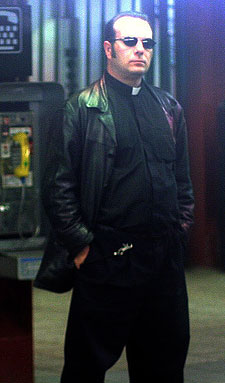You can learn a lot from the heroes people follow. Among the post-boomer clergy of this diocese one newish hero is Mark Driscoll. There's no "Rev" with his name, because this is a bloke without seminary training who went out and planted a thriving mega-church in the godless city of Seattle.
He is a preacher with attitude, ticks all the doctrine boxes that Sydangs generally tick, but reaches the people white picket fence Christianity scares off. In this town they are the culturally liberal, Herald-reading, globally-connected city types who write Christians off as a bunch of Fred Niles. They are not so different from the cyber citizens of affluent Seattle, home of Amazon and Starbucks, except we drink coffee.
Driscoll is at home in the culture without surrendering the gospel to it, or becoming isolated from it. This pewsitter finds that a hard act to pull off. Fall off the pew one side and you edge towards liberalism. Fall off the other and you lapse into comfortable fundamentalism. There've been times in my life when I have done both at once (it's called hypocrisy).
 While preachers have picked up on Driscoll " who has attracted flak for using words stronger than damn in his sermons and talking frankly about sex " he might have good things to say for us pew fodder.
While preachers have picked up on Driscoll " who has attracted flak for using words stronger than damn in his sermons and talking frankly about sex " he might have good things to say for us pew fodder.
"People convert to our church, and friendship with its members first, and second to God," he says in his book Radical Reformission, in describing unsaved people connecting to church members and helping to run concerts, helping to develop a website, joining a Bible study or serving the needy. Hospitality and friendship are key to Driscoll's evangelism, and the boundaries between evangelism and discipleship are deliberately blurred.
The Introducing God and Alpha courses use this principle already. Have you ever wondered why they are so long? Ten or thirteen weeks long? In effect people in these courses experience small group Bible study before they become Christians. They get the look and feel of Christianity. The first Introducing God course, held at the Roxbury pub in Glebe, was too short. Dominic Steele made it longer and it worked better.
That leads on to the Driscoll material that at least some Sydangs will find difficult. The gospel presented as propositions or information (alone) won't work for Driscoll. Postmodern people " the sort he concentrates on " need to experience or see Christian faith and ministry lived openly and receive the gospel in that context.
The look and feel of our church gatherings " and what we do when not sitting in the pews " becomes terribly important.
That could be scary for two reasons. One is the very Sydang approach that anything that values experience, devalues the word. The other is that if the gospel is hidden… we can no longer blame the preachers, my fellow pewsitters.
Driscoll, from the city that brought us virtual reality, wants the real thing. "Christians and their churches (must) move forward on their knees, continually confessing their addictions to morality and the appearance of godliness, which does not penetrate the heart and transform lives."
God, save us from skin deep respectability.




















